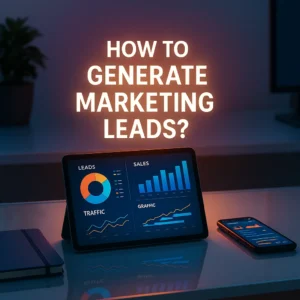Gone are the days of relying solely on traditional lead generation techniques. Artificial intelligence (AI) has revolutionized how businesses generate leads, offering new strategies, tools, and insights to drive growth and success. Thanks to advanced algorithms and data analysis, companies are now able to identify potential customers more effectively, streamline their marketing efforts, and ultimately increase sales. 💰
In this article, we will explore how to leverage AI for lead generation, and how businesses can harness the power of AI to optimize their lead generation efforts. We will uncover some top tactics and tools and discuss important considerations such as compliance and ethical practices in the AI-driven lead generation domain.
What is Lead Generation?
Lead generation – the lifeblood of any successful business. At its core, lead generation is the process of identifying and attracting potential customers who have expressed interest in your products or services. But it goes far beyond that. It’s a strategic endeavor that requires a deep understanding of your target audience, tailored marketing campaigns, and a commitment to nurturing and converting these leads into paying customers.
Few Lead Generation Strategies:
-
- Content Marketing: Creating valuable content (blogs, videos, infographics) that attracts potential leads.
- Social Media Marketing: Using platforms like Facebook, LinkedIn, and Twitter to engage with your audience and drive traffic to your website.
- Email Marketing: Sending targeted emails to nurture leads and keep them informed about your offerings.
- Paid Advertising: Utilizing pay-per-click (PPC) ads or social media ads to reach a broader audience.
How AI Enhances Lead Generation
Data Analysis: Unlocking Hidden Insights
Artificial intelligence (AI) tools can analyze vast amounts of data quickly and accurately, uncovering patterns and trends that may not be visible to the human eye. In the context of lead generation, AI algorithms can identify potential leads based on behavior, demographics, and preferences, allowing businesses to target their efforts more effectively. This analysis can be done in real time, enabling companies to respond promptly to changing market conditions and customer needs.
For example, AI can analyze website traffic, social media interactions, and customer feedback to identify:
- High-value customer segments with specific pain points or interests
- Key behavioral triggers that indicate a lead is ready to buy
- Geographic areas with high concentrations of potential customers
Predictive Analytics: Forecasting Success
AI-powered predictive analytics uses historical data to forecast which leads are most likely to convert. By analyzing past behavior, demographics, and other relevant factors, AI algorithms can predict the likelihood of a lead becoming a customer.
This allows businesses to prioritize their efforts towards high-potential prospects, maximizing the effectiveness of their lead generation strategies.
For instance, predictive analytics can help identify:
- Leads with a high probability of conversion based on past behavior and demographics
- The most effective marketing channels and tactics for each lead segment
- The optimal timing and frequency of follow-ups and nurturing campaigns
Personalization: Tailoring Messages for Maximum Impact
AI enables businesses to create personalized marketing messages tailored to individual preferences, increasing engagement and conversion rates. By analyzing customer behavior and preferences, AI algorithms can recommend products or services that are most likely to interest each lead.
For example, AI-powered personalization can:
- Recommend products based on a customer’s purchase history and browsing behavior
- Tailor email campaigns to individual preferences, interests, and pain points
- Use dynamic content to adjust messaging in real time based on customer interactions
Chatbots and Virtual Assistants: Real-Time Engagement
Chatbots and virtual assistants powered by AI enable businesses to interact with website visitors in real time, answering questions, qualifying leads, and even scheduling appointments automatically. This improves the customer experience, increases engagement, and helps businesses qualify leads more effectively.
AI-powered chatbots can:
- Respond to common questions and concerns, freeing up human customer support agents for more complex issues
- Gather information from leads and qualify them based on their interests and needs
- Schedule appointments and follow-ups, reducing the need for manual intervention
Automated Outreach: Timely and Targeted
AI-powered automation tools can streamline lead-generation efforts by automating email campaigns, social media outreach, and other marketing activities. This ensures timely follow-ups and nurturing campaigns, without the need for manual intervention.
Automated outreach can:
- Send targeted email campaigns based on user interactions and preferences
- Schedule social media posts and updates to maximize engagement and visibility
- Trigger personalized follow-ups and nurturing campaigns based on lead behavior
Lead Scoring: Prioritizing high-potential Leads
AI algorithms can assign scores to leads based on their likelihood of conversion, enabling sales teams to focus their efforts where they are most likely to succeed. Lead scoring takes into account a range of factors, including behavior, demographics, and engagement.
Lead scoring can:
- Identify high-potential leads that require immediate attention from sales teams
- Prioritize follow-ups and nurturing campaigns based on lead scores
- Help businesses optimize their lead generation strategies for maximum ROI
Market Segmentation: Targeting Specific Groups
AI-powered market segmentation enables businesses to segment audiences more accurately, based on behavior trends and customer preferences. This allows companies to target specific groups with tailored messaging, increasing the effectiveness of their marketing efforts.
Market segmentation can:
- Identify high-value customer segments with specific pain points or interests
- Create targeted marketing campaigns based on customer behavior and preferences
- Optimize marketing strategies for maximum ROI and customer engagement
By leveraging these AI-powered capabilities, businesses can enhance their lead generation efforts, improve customer engagement, and ultimately drive revenue growth.
Companies that Leverage AI in Lead Generation
[su_table]
Company |
AI Application |
Details |
|---|---|---|
| Starbucks | Personalized messaging and customer engagement | Starbucks leverages AI to analyze customer data, enabling the creation of personalized messages aimed at increasing participation in their rewards program. This includes product recommendations based on individual purchase history and location, enhancing customer engagement and loyalty. |
| Goosehead Insurance | Content creation and marketing automation | Goosehead Insurance employs Jasper AI to automate the generation of marketing content. This approach streamlines the lead generation process, allowing the company to efficiently engage potential customers through tailored campaigns that resonate with their needs. |
| JPMorgan Chase | Engaging ad copy generation | JPMorgan Chase has partnered with Persado to utilize AI for crafting compelling ad copy. This collaboration focuses on improving customer engagement and driving lead generation by creating messages that resonate better with target audiences, ultimately enhancing marketing effectiveness. |
[/su_table]
Future Trends in AI for Lead Generation
As businesses seek innovative ways to connect with potential customers and optimize their marketing strategies, several key trends are emerging that will shape the future of AI in lead generation.
1. Emerging Technologies
- Advanced Machine Learning Models: The use of more sophisticated machine learning algorithms will allow businesses to analyze vast amounts of data more effectively. For example, deep learning techniques can identify patterns and insights from customer interactions that traditional models might miss.
- Voice Search Optimization: With the rise of voice-activated devices like smart speakers and virtual assistants, optimizing content for voice search is becoming crucial. Businesses may utilize AI to tailor their messaging based on common voice queries related to their products or services.
- Augmented Reality (AR) and Virtual Reality (VR): These technologies can enhance customer engagement by providing immersive experiences. For instance, a real estate company could use VR tours powered by AI recommendations to showcase properties tailored to specific buyer preferences.
2. Evolution of Customer Expectations
- Hyper-Personalization: Customers increasingly expect personalized experiences based on their behavior and preferences. AI can analyze past interactions and predict future needs, enabling companies to deliver tailored content or offers that resonate with individual leads.Example: An online clothing retailer might use AI-driven analytics to recommend outfits based on a customer’s previous purchases and browsing history.
- Real-Time Engagement: Prospective customers want immediate responses when they interact with brands. Chatbots equipped with natural language processing capabilities can engage users instantly, answering questions or guiding them through the sales funnel without delays.
3. Predictive Insights and Innovations
- Predictive Analytics for Lead Scoring: Future trends indicate an increasing reliance on predictive analytics tools that assess which leads are most likely to convert into customers. By analyzing historical data combined with current behaviors, businesses can prioritize efforts toward high-potential leads.Example: A software company may implement predictive lead scoring models that evaluate user engagement metrics—like website visits or demo requests—to determine which prospects should be contacted first.
- Integration with IoT Devices: As Internet of Things (IoT) devices proliferate, there’s potential for leveraging data from these devices for lead generation purposes. Companies could gather insights about consumer habits through connected appliances or wearables.Example: A health tech firm might track fitness app usage patterns from wearable devices to identify individuals who would benefit from its wellness programs.
Compliance and Ethical Considerations in AI Lead Generation
As AI technologies progress further, businesses must navigate the complex landscape of data privacy and protection to ensure that their AI-driven lead-generation strategies align with legal and ethical standards. In this section, we will discuss the two critical aspects: understanding AI and GDPR compliance, and ethical considerations in AI-driven lead generation.
Understanding AI and GDPR Compliance
AI technology has opened up new possibilities for lead generation, but it also brings forth challenges related to data compliance. One specific regulation that organizations must adhere to is the General Data Protection Regulation (GDPR). Adopted by the European Union, GDPR sets strict guidelines for how personal data should be collected, stored, and processed.
AI-powered lead generation involves the processing of vast amounts of data, including personal information.
Businesses must understand the principles of GDPR compliance to protect individuals’ privacy rights and avoid legal repercussions. By ensuring that their AI systems meet GDPR requirements, businesses can build trust with their potential leads and maintain ethical practices in their lead-generation efforts.
Ethical Considerations in AI-Driven Lead Generation
While AI has the potential to greatly enhance lead generation, organizations must also grapple with ethical considerations that arise from its use. Some key ethical concerns include the potential for bias, discrimination, and invasion of privacy. Businesses need to ask themselves important questions about the fairness, transparency, and accountability of their AI systems.
Moreover, the use of AI in lead generation can raise ethical questions about consent, data ownership, and data-sharing practices. Organizations must ensure that they have clear policies and procedures in place to address these concerns and uphold ethical standards.
Once ethical considerations are incorporated into their AI-driven lead generation strategies, businesses can build stronger relationships with their leads and take a responsible approach to data-driven decision-making.
Final Thoughts
Integrating artificial intelligence into lead generation processes not only improves efficiency but also enhances the effectiveness of marketing strategies. By leveraging data analysis, personalization techniques, automated tools like chatbots, and predictive capabilities, businesses can cultivate stronger relationships with potential customers while maximizing conversion rates.
FAQ
What are the benefits of using AI in lead generation?
Using AI in lead generation offers several benefits, including improved lead quality and conversion rates, increased efficiency and productivity, reduced costs, enhanced customer engagement and personalization, and more accurate lead scoring and targeting.
How can AI technology optimize the lead generation process?
AI technology can optimize the lead generation process by automating repetitive tasks, analyzing large amounts of data to identify patterns and trends, personalizing interactions with leads, enhancing lead scoring accuracy, and providing valuable insights for making data-driven decisions.
How can big data analytics be utilized in AI lead generation?
Big data analytics plays an important role in AI lead generation by allowing businesses to collect, analyze, and interpret large volumes of data in real time. This enables businesses to gain valuable insights into their target audience, identify trends and patterns, and make informed decisions to optimize their lead-generation strategies.
Can AI enhance lead nurturing and follow-up activities?
AI can enhance lead nurturing and follow-up activities by automating personalized interactions with leads at scale. It can deliver timely and relevant content based on lead behavior and preferences, increasing engagement and speeding up the lead nurturing process.
Can AI optimize sales and marketing efforts?
AI can optimize sales and marketing efforts by improving sales funnel optimization, enhancing conversion rates, enabling account-based marketing strategies, and providing actionable insights for targeted and personalized marketing campaigns.
What does the future hold for lead generation with AI?
The future of lead generation lies in embracing AI for a competitive edge. As AI technology continues to advance, businesses will benefit from more sophisticated AI algorithms, improved data analysis capabilities, and enhanced automation, leading to more targeted and effective lead-generation strategies.


